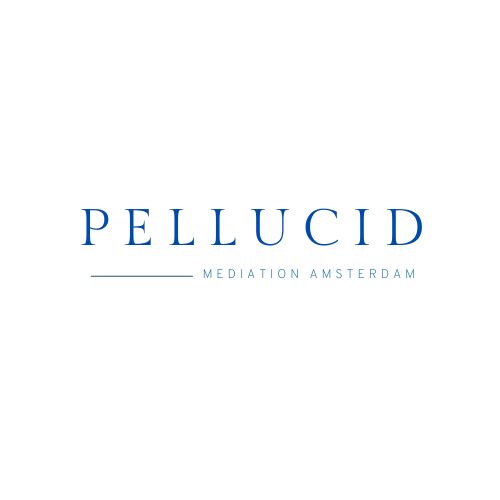Professional business mediation
Welcome to Pellucid: your Amsterdam based partner in business mediation. Discover how I foster effective and fair solutions to your commercial disputes, focussing on integrity and results.
Pellucid:
- clear in meaning, expression or style;
- allowing the maximum passage of light;
- clear or limpid
– dictonary.com

What is business mediation?
Business mediation is a form of alternative dispute resolution (ADR) where a neutral third party, called a mediator, helps businesses involved in a dispute to communicate and work towards a mutually acceptable agreement. The proceedings are always confidential in nature. Furthermore, it is a voluntary process, meaning the parties involved actively choose to participate. They may withdraw from the process at any given time. Importantly, the mediator does not have the authority to make decisions or impose a resolution. Instead, the parties themselves are in the driving seat when it comes to formulating a fair and sustainable solution to the conflict. In this respect, often a package deal is agreed upon, meaning that the solution to the contested points is only binding upon the parties if and when these are put down in writing and signed by both parties. It is the mediator’s responsibility to guide them in this process, by fostering open communication and improved understanding for eachother’s position and interests.
The proposition
When enlisting Pellucid’s services, these consist of the following:
- Conflictanalysis: Identification of the core issue(s) underpinnig your commercial dispute.
- Mediation: Respectful and professional leading of the process towards a fair and sustainable solution to the conflict.
- Tailor-made approah: Each dispute is unique, and so is the appropriate solution thereto.
- Communication: Help in restoring trust in the other party with a view to preserving the business relationship.

What to expect?
To help decide whether mediation might be a suitable option to resolve your commercial dispute, please read on about the process, the pro’s and the cons.

How does mediation work?
Initiation: Mediation begins when the parties involved agree to resolve their dispute through mediation. They may be referred to mediation by a court; as a consequence of a contractual stipulation; or decide on it independently.
Selection of a Mediator: The parties agree on a neutral mediator, or one may be assigned by an organization or a court. The mediator is trained in conflict resolution but does not take sides.
Opening Statements: Each party typically has the opportunity to present their view of the dispute without interruption. This helps set the tone for open communication.
Negotiation and Dialogue: The mediator facilitates discussions between the parties, encouraging them to express their concerns and needs. The mediator might ask questions, clarify points, and help both sides explore possible solutions.
Private Sessions (Caucuses): Sometimes, the mediator may meet with each party separately (called a caucus) to explore sensitive issues and explore if there is room for compromise or understanding that can’t be discussed openly.
Agreement: If the parties reach a resolution, the mediator will help draft a written agreement that outlines the terms. This agreement is binding upon the parties upon signature.

When is mediation suitable?
Mediation is particularly effective when:
Speed and Cost are Concerns: Mediation can often resolve disputes more quickly and at a lower cost than going through litigation or arbitration. This makes it an attractive option for those looking for an efficient resolution.
Parties are Willing to Cooperate: Mediation works best when both parties are willing to engage in dialogue and compromise. It’s a collaborative process, so both sides need to be open to finding a solution.
The Dispute is Not Too Complex: Mediation is often used for resolving disputes related to business disagreements. While mediation can address complex issues, it might not be ideal for highly technical or legal disputes where formal legal expertise is necessary.
Confidentiality is Important: Mediation is typically private, meaning discussions during the mediation process cannot be used later in court. This can make it attractive to parties who wish to keep their dispute and any resolution thereto confidential.
Parties Want to Preserve Relationships: Mediation helps preserve relationships because the process is cooperative and focuses on mutual benefits. It’s useful when the parties need to continue working together, such as in (long term) business partnerships.

When mediation might not be suitable
Imbalance of Power: If there is a significant power imbalance between the parties, mediation may not be appropriate because of power dynamics in bringing about a solution to the conflict.
Unwillingness to Compromise: If one or both parties are not open to negotiation or compromise, mediation may not be effective.
Need for Legal Precedent or Enforcement: In cases where the dispute requires a legal ruling or the enforcement of rights under the law (e.g., criminal fraud cases or disputes requiring a clear legal decision), mediation might not provide the resolution needed.

A little backgroud information
From a young age, I have had a keen sense of justice, a passion for writing and a desire to discover the world. This has sparked a non-cookie cutter career path in private law and public diplomacy. Both in work as in life, my approach is one of sincerity, quality and compassion. To me, there is nothing more rewarding than to connect people and ideas.
My background is in law. Over the years, I have worked for a wide range of organisations and sectors, on topics ranging from intellectual property to business & human rights. Back in 2010. I trained as a mediator to NMI (Netherlands Mediation Institute) standards at the Haarlem based Centre for Conflict Management. Since then, I have developed a keen interest in English language based dispute resolution. Having lived and worked abroad for many years, I can relate to varying political and cultural backgrounds in which business is conducted. Altough my first language is Dutch, my command of English is near-native, which ensures that none of the intricacies expressed will get lost in translation. In my experience, this is key to a succesful (intercultural) mediation.
Mediation styles do vary, so it is important that you feel comforable with the professional you enlist. My style can best be described as Pellucid: clear, compassionate and solution oriented.
Contact
When contemplating whether or not to resort to mediation, of course a number of practicalities – such as location, fees, envisaged timeframe etc. – play a role as well. In order to discuss these and other queries you may have, I warmly invite you to contact me:
Pellucid | Murielle Poels LL.M.
Phone: + 31 6 4524 1969
Email: info@pellucid.nl
Photo’s (edited)| Vases: raygar-he-M70PRMZtzt8-unsplash | Puzzle: pexels-tara-winstead-8385821| Key: aneta-pawlik-qWRSHoeTn2I-unsplash | Open doors: phil-5i0GnoTTjSE-unsplash | Shutters: pexels-pixabay-534090 | Portrait: private collection
